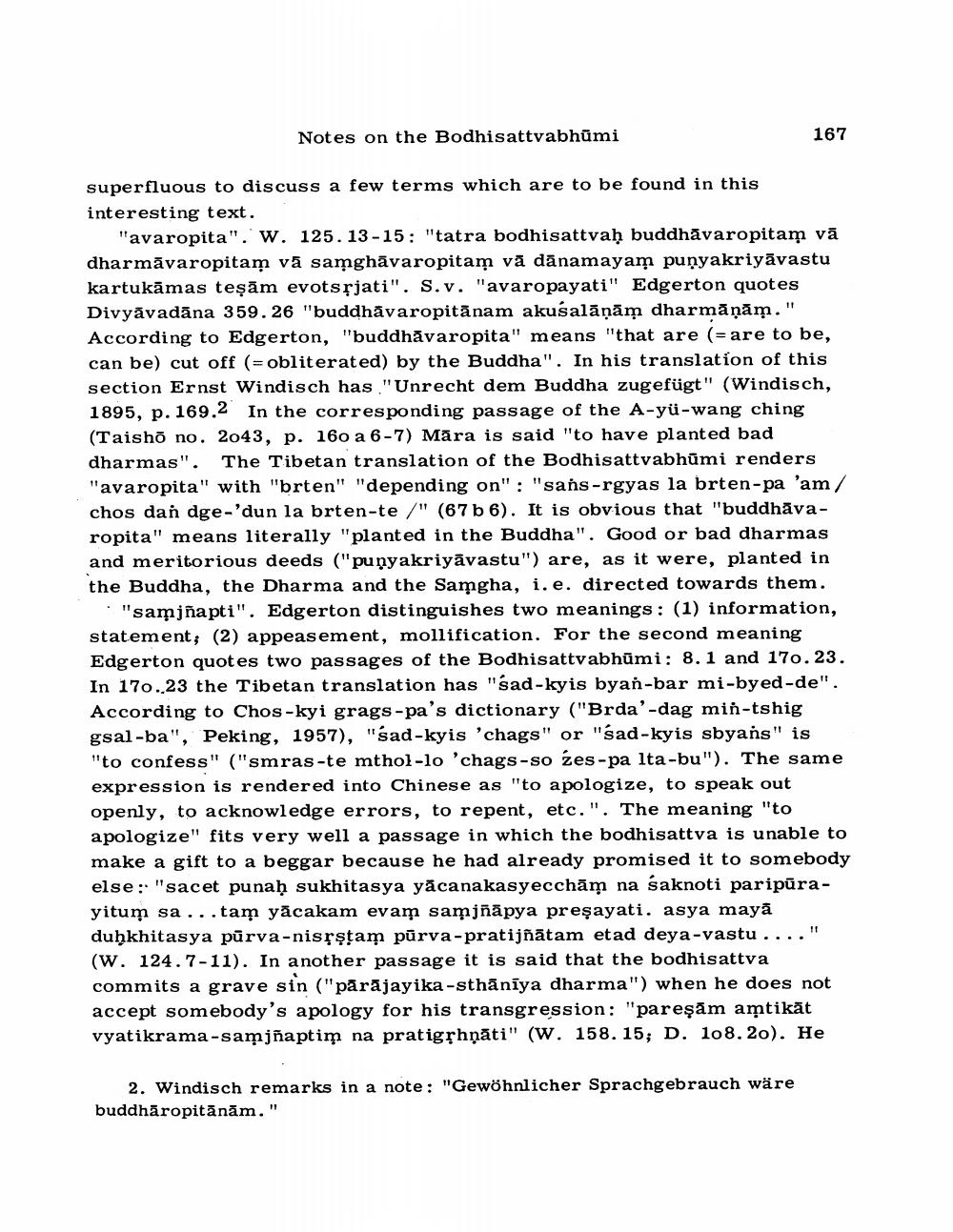Book Title: Notes On Bodhisattvabhumi Author(s): J W De Jong Publisher: J W De Jong View full book textPage 5
________________ Notes on the Bodhisattvabhūmi 167 superfluous to discuss a few terms which are to be found in this interesting text. "avaropita". W. 125. 13-15 : "tatra bodhisattvaḥ buddhāvaropitam vā dharmāvaropitam vá samghāvaropitam vā dānamayam punyakriyāvastu kartukāmas teşām evotsșjati". s.v. "avaropayati" Edgerton quotes Divyāvadāna 359.26 "buddhāvaropitānam akusalāņām dharmāņām." According to Edgerton, "buddhāvaropita" means "that are (= are to be, can be) cut off (= obliterated) by the Buddha". In his translation of this section Ernst Windisch has "Unrecht dem Buddha zugefügt" (Windisch, 1895, p. 169.2 In the corresponding passage of the A-yü-wang ching (Taisho no. 2043, p. 160 a 6-7) Māra is said "to have planted bad dharmas". The Tibetan translation of the Bodhisattvabhūmi renders "avaropita" with "brten" "depending on": "sans-rgyas la brten-pa 'am/ chos dan dge-'dun la brten-te/" (67b 6). It is obvious that "buddhāvaropita" means literally "planted in the Buddha". Good or bad dharmas and meritorious deeds ("punyakriyāvastu") are, as it were, planted in the Buddha, the Dharma and the Samgha, i.e. directed towards them. - "samjña pti". Edgerton distinguishes two meanings : (1) information, statement; (2) appeasement, mollification. For the second meaning Edgerton quotes two passages of the Bodhisattvabhūmi: 8.1 and 170.23. In 170.23 the Tibetan translation has "sad-kyis byan-bar mi-byed-de". According to Chos-kyi grags-pa's dictionary ("Brda'-dag min-tshig gsal-ba", Peking, 1957), "sad-kyis 'chags" or "sad-kyis sbyans" is "to confess" ("smras-te mthol-lo 'chags-so zes-pa Ita-bu"). The same expression is rendered into Chinese as "to apologize, to speak out openly, to acknowledge errors, to repent, etc.". The meaning "to apologize" fits very well a passage in which the bodhisattva is unable to make a gift to a beggar because he had already promised it to somebody else :: "sacet punaḥ sukhitasya yăcanakasyecchām na saknoti paripūrayitum sa...tam yācakam evam samjñāpya preşayati. asya mayā duḥkhitasya pūrva-nissştam pūrva-pratijñātam etad deya-vastu ...." (W. 124.7-11). In another passage it is said that the bodhisattva commits a grave sin ("pārājayika-sthānīya dharma") when he does not accept somebody's apology for his transgression: "pareşām amtikāt vyatikrama-samjñaptim na pratigshṇāti" (w. 158. 15; D. 108. 20). He 2. Windisch remarks in a note : "Gewöhnlicher Sprachgebrauch wäre buddhāropitānām."Page Navigation
1 ... 3 4 5 6 7 8 9 10
